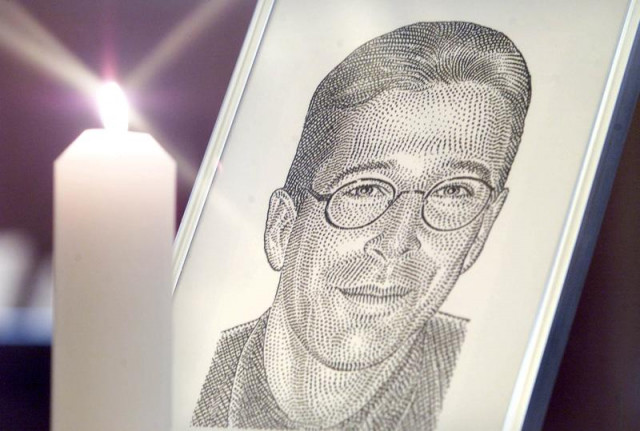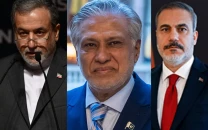Centre joins Sindh govt’s legal battle to punish Pearl’s murder accused
Slain journalist’s family also expresses intention to file a review petition against the ‘illegal and unjust’ decision

After a strong reaction by the United States to the apex court’s Thursday decision to acquit all those accused of kidnapping and killing Wall Street Journal’s former bureau chief Daniel Pearl, the state functionaries have intensified their efforts in a “damage control” move.
Attorney General for Pakistan (AGP) Khalid Javed Khan on Saturday issued a statement – the second since Thursday –stating that the federal government has decided to formally join review proceedings initiated by the Sindh government against the Supreme Court’s January 28 verdict.
It said the federal government will shortly move an application, requesting the SC to allow it to join as a party in the case. The statement revealed that the federal government will also move an application for the formation of a larger bench to hear the review petitions.
It said the federal government along with the provincial government “shall continue to undertake all legal steps to bring perpetrators of the heinous crime to justice in accordance with laws of Pakistan.”
A three-judge bench, comprising Justice Mushir Alam, Justice Sardar Tariq Masood and Justice Yahya Afridi, on Thursday acquitted all Pearl case accused –Ahmed Omar Saeed Sheikh, Fahad Naseem, Syed Salman Saqib and Sheikh Muhammad Adil – who have been languishing in jail for the last 18 years.
However, Justice Afridi while dissenting with the majority order, partly allowed the Sindh government appeal in terms that Omer Saeed and Fahad Nasim, who were convicted under sections 365-A and 120-B, PPC and section 7 of the Anti-Terrorism Act, 1997.
The Sindh government quickly moved the Supreme Court on Friday seeking review of its majority judgment, despite the fact that the apex court has not yet issued a detailed written order. The apex court on Friday night also issued a cause-list, placing the petition for review by the same bench on February 1.
Under the Supreme Court Rules, review has very limited scope.
Now a debate has started on the political implications of the SC’s short order. One section of lawyers believes that the government should have pursued the case as actively as it pursued the Justice Isa case.
When the case was listed for the first time, Justice Manzoor Ahmad Malik and Justice Qazi Muhammad Amin Ahmed were part of the bench.
Renowned lawyer Saiful Malook, who successfully argued the Asia Bibi case, endorsed the majority judgment and said the principle is that the chain from crime to the neck of an accused should be unbroken. "In this case the chain is broken everywhere. The police failed to collect proper evidence."
Malook noted that after Zulfikar Ali Bhutto murder case it is the second criminal case which was heard by the apex court for two months. The senior lawyer, however, urged Chief Justice of Pakistan Gulzar Ahmed to constitute a full-court to hear review petition in view of severe international repercussions.
He said the SC while exercising its power under Article 187 of the Constitution has also allowed American lawyers to plead the review petition. Malook said the US government must accept that the Supreme Court of Pakistan is as independent as its own top court.
“When the executive led by former US president Trump could not influence the US Supreme Court to accept their petitions on election rigging then how Pakistan government may influence its judiciary which is acting independently without fear and favour.”
Regarding the US government’s demand to try Omar Sheikh in their country, Malook said it is against Article 13 of the Constitution as no one can be tried twice for the same offences.
The Sindh High Court (SHC) on April 2 acquitted the three accused and commuted the death sentence of Omar Saeed to seven-year imprisonment.
The SHC had noted that the Daniel Pearl case was extremely high profile in which the Pakistani authorities as well as “one of our closest allies who sent their investigation and experts” to assist the Pakistani police wanted fast results.
“In this background, we are in no doubt that Pakistani police were under huge pressure to ‘get results’ either in terms of safe return of Pearl or to arrest those responsible for his disappearance.
“Under these circumstances, it would not be completely surprising if the police resorted to rough tactics in order to extract confessions.
“This is not a new phenomenon only in developing societies but also in developed societies unless stringent laws are made to prevent such practices and are also implemented,” the judgment said.
Pearl’s family to challenge “unjust decision”
Meanwhile, the slain journalist’s family has also said in a statement that it intends to file a review petition against the “illegal and unjust” majority decision of the Supreme Court of Pakistan to ensure that Ahmed Omer Sheikh and his co-conspirators are brought to justice for the kidnapping and murder of Daniel Pearl.
It is beyond belief that Ahmed Omar Sheikh — who, after 18 years of lies, had finally admitted in a handwritten letter to the court his role in the kidnapping for ransom of Daniel Pearl — has been given a clean slate and let loose once again upon the world to continue his international terrorist activities, read the statement.
“We appreciate the continuing efforts of the Pakistani federal government, the Sindh provincial government and the US government to ensure that the killers of Daniel Pearl are punished and kept in custody. We also appreciate the minority judgment of Justice Yahya Afridi for his independence and courage in bringing to justice Ahmed Omar Sheikh and Fahad Naseem.”
Lastly, we thank journalists everywhere, especially in Pakistan, and the people of Pakistan, for ensuring our voice for justice for Daniel Pearl is heard, the family said in the statement.
The victim’s family maintained that their fight for justice for Daniel Pearl is not merely a personal struggle but a struggle for the independence of all journalists and all innocent victims of terrorism in Pakistan and worldwide.
“Our voice for justice may have suffered a temporary setback by this travesty of justice but it will never be silenced, and we remain committed in our quest for justice for Daniel Pearl for his independence and courage in bringing to justice Ahmed Omar Sheikh and Fahad Naseem.”
Pearl’s murder
Daniel Pearl, 38, was the South Asia bureau chief for The Wall Street Journal when he was abducted in Karachi in January 2002. Pearl’s wife Marianne Pearl, a US national who was living in Karachi, wrote a letter to the Artillery Maidan police on February 2, 2002, stating that her husband disappeared on January 23, 2002.
Later, a graphic video showing Pearl’s decapitation was delivered to the US consulate in Karachi nearly a month after he was kidnapped. After this, a case was filed against the suspects and 23 witnesses were produced in the case by the prosecution. Sheikh was arrested in February 2002.



















COMMENTS
Comments are moderated and generally will be posted if they are on-topic and not abusive.
For more information, please see our Comments FAQ